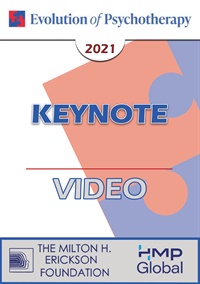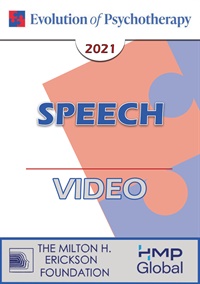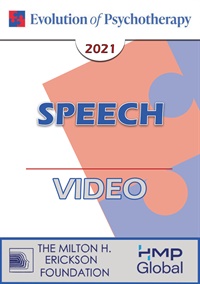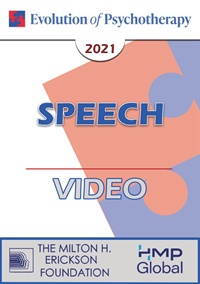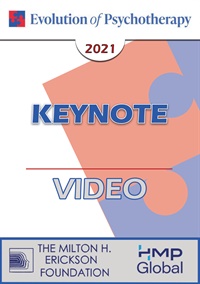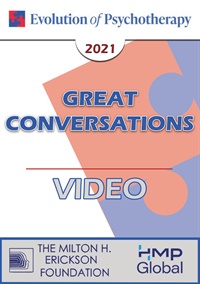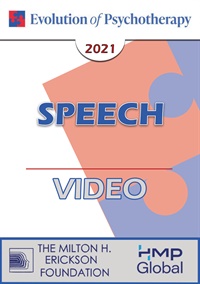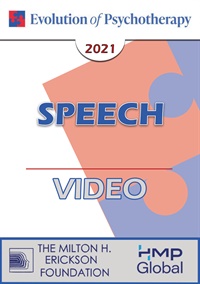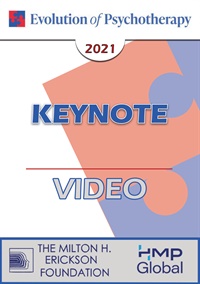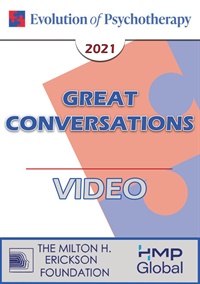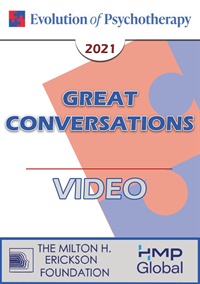- Average Rating:
- Not yet rated
- Topic Areas:
- Keynotes | Developmental Therapy Model | Couples Therapy
- Categories:
- Couples Conference | Couples Conference 2023 | Pioneers in Couples and Family Therapy
- Faculty:
- Ellyn Bader, PhD
- Course Levels:
- Master Degree or Higher in Health-Related Field
- Duration:
- 30:53
- Format:
- Audio and Video
- Original Program Date:
- May 05, 2023
- Short Description:
- An overview of the Developmental Model in couples therapy, focusing on transformative strategies for therapists. Learn how to guide couples through predictable relationship stages, support individual growth, and create lasting change through strong leadership, emotional risk-taking, and strategic interventions. Includes practical techniques for managing client challenges and fostering deeper intimacy.
- Price:
- $59.00 - Base Price
- Average Rating:
- Not yet rated
- Topic Areas:
- Keynotes | Therapist Development | Consciousness | Identity | Attachment
- Categories:
- Evolution of Psychotherapy | Evolution of Psychotherapy 2021
- Faculty:
- Diane Ackerman, MFA, PhD
- Course Levels:
- Master Degree or Higher in Health-Related Field
- Duration:
- 1 hour
- Format:
- Audio and Video
- Original Program Date:
- Dec 05, 2021
- Short Description:
- This keynote is a sweeping, poetic tour of what makes a self, blending neuroscience, evolution, memory, relationships and metaphor into a vivid portrait of human identity. Diane Ackerman explores how the brain constructs experience, how relationships shape our inner life, and how memory, emotion and imagination continually revise who we are. Participants are invited into a playful, profound meditation on consciousness, connection and the ever-changing mosaic of selves we carry through the world.
- Price:
- $59.00 - Base Price
- Average Rating:
- Not yet rated
- Topic Areas:
- Feedback Informed Treatment (FIT) | Psychotherapy | Speeches | Therapist Development
- Categories:
- Evolution of Psychotherapy | Evolution of Psychotherapy 2021
- Faculty:
- Scott Miller, PhD
- Course Levels:
- Master Degree or Higher in Health-Related Field
- Duration:
- 1 hour
- Format:
- Audio and Video
- Original Program Date:
- Dec 04, 2021
- Short Description:
- What can mental health professionals do to enhance their performance? Available evidence makes clear that attending a typical continuing education workshop, specializing in the treatment of a particular problem, or learning a new treatment model does little to improve effectiveness. In fact, studies to date indicate clinical effectiveness actually declines with time and experience in the field. The key to improved performance is engaging in deliberate practice. At this workshop, the latest research on deliberate practice will be translated into concrete steps all clinicians can immediately apply in their efforts to achieve better results.
- Price:
- $59.00 - Base Price
- Average Rating:
- Not yet rated
- Topic Areas:
- Psychotherapy | Speeches | Therapist Development
- Categories:
- Evolution of Psychotherapy | Evolution of Psychotherapy 2021
- Faculty:
- Derald Wing Sue, PhD
- Course Levels:
- Master Degree or Higher in Health-Related Field
- Duration:
- 1 hour
- Format:
- Audio and Video
- Original Program Date:
- Dec 03, 2021
- Short Description:
- "In the United States, the omnipresence of racial bias and bigotry has led many to question the reasons for their persistence in light of widespread public condemnation. Social scientists have proposed a number of reasons for people’s failure to act: (a) the invisibility of modern forms of bias, (b) trivializing an incident as innocuous, (c) diffusion of responsibility, (d) fear of repercussions or retaliation, and (e) the paralysis of not knowing what to do. This presentation is aimed at addressing the last reason by providing participants with a repertoire of anti-bias strategies and tactics to overcome the expressions of microaggressions.
- Price:
- $59.00 - Base Price
- Average Rating:
- Not yet rated
- Topic Areas:
- Psychotherapy | Speeches | Therapist Development
- Categories:
- Evolution of Psychotherapy | Evolution of Psychotherapy 2021
- Faculty:
- Donald Meichenbaum, PhD
- Course Levels:
- Master Degree or Higher in Health-Related Field
- Duration:
- 1 hour
- Format:
- Audio and Video
- Original Program Date:
- Dec 03, 2021
- Short Description:
- This presentation will discuss ways to bolster resilience across the full life span from high-risk children youth adults and the elderly. It will examine the neurobiological and psycho -social changes that accompany engaging in resilience-engendering behaviors.
- Price:
- $59.00 - Base Price
- Average Rating:
- Not yet rated
- Topic Areas:
- Keynotes | Therapist Development
- Categories:
- Evolution of Psychotherapy | Evolution of Psychotherapy 2021
- Faculty:
- John Gottman, PhD | Julie Gottman, PhD
- Course Levels:
- Master Degree or Higher in Health-Related Field
- Duration:
- 1 hour
- Format:
- Audio and Video
- Original Program Date:
- Dec 03, 2021
- Short Description:
- A Keynote featuring John Gottman, PhD, and Julie Gottman, PhD, from the 2021 Evolution of Psychotherapy Conference.
- Price:
- $59.00 - Base Price
Tags: Therapist Development
- Average Rating:
- Not yet rated
- Topic Areas:
- Great Conversations | Psychotherapy | Therapist Development
- Categories:
- Evolution of Psychotherapy | Evolution of Psychotherapy 2021
- Faculty:
- Donald Meichenbaum, PhD
- Course Levels:
- Master Degree or Higher in Health-Related Field
- Duration:
- 1 hour
- Format:
- Audio and Video
- Original Program Date:
- Dec 03, 2021
- Short Description:
- Unlike surgeons, psychotherapists usually do not get better with years of practice. Why is that? What skills are most important to develop in clinical training programs, and does it actually happen? Should we be focusing on evidence-based treatment techniques, interpersonal therapeutic skills, cultural competence, deliberate practice, scientific skepticism, fostering clients' strengths and resilience? Three seasoned clinical trainers reflect on the joys, challenges, and outcomes of preparing future psychotherapists.
- Price:
- $59.00 - Base Price
- Average Rating:
- Not yet rated
- Topic Areas:
- Speeches | Therapist Development
- Categories:
- Evolution of Psychotherapy | Evolution of Psychotherapy 2021
- Faculty:
- William Miller, PhD
- Course Levels:
- Master Degree or Higher in Health-Related Field
- Duration:
- 1 hour
- Format:
- Audio and Video
- Original Program Date:
- Dec 02, 2021
- Short Description:
- Sometimes regarded as "resistance," ambivalence is a normal human reaction to potential change and a fundamental dynamic in helping relationships whereby well-intended efforts can backfire. In practice there is an important conscious choice between neutrality and direction, leading to different clinical strategies. Dr. Miller will describe different responses to client ambivalence, and their consequences.
- Price:
- $59.00 - Base Price
Tags: Therapist Development
- Average Rating:
- Not yet rated
- Topic Areas:
- Psychotherapy | Speeches | Therapist Development
- Categories:
- Evolution of Psychotherapy | Evolution of Psychotherapy 2021
- Faculty:
- Stephen Gilligan, PhD
- Course Levels:
- Master Degree or Higher in Health-Related Field
- Duration:
- 1 hour
- Format:
- Audio and Video
- Original Program Date:
- Dec 02, 2021
- Short Description:
- This talk identifies the seven core dimensions of an effective, sustainable therapy change: 1. a state of positive well being, 2. a positive resonant goal, 3. resources, 4. welcoming obstacles, 5. fluid "ideas of achievement", 6. commitment to practical action, 7. commitment to daily practices. The practical ways to develop and integrate these complementary dimensions will be highlighted.
- Price:
- $59.00 - Base Price
- Average Rating:
- Not yet rated
- Topic Areas:
- Art and Creativity | Keynotes | Therapist Development
- Categories:
- Evolution of Psychotherapy | Evolution of Psychotherapy 2021
- Faculty:
- Rob Kapilow
- Course Levels:
- Master Degree or Higher in Health-Related Field
- Duration:
- 1 hour
- Format:
- Audio and Video
- Original Program Date:
- Dec 02, 2021
- Short Description:
- "At the heart of psychotherapy is the idea that listening to someone is an inherently healing act. Can an understanding of the grammar of music help us better understand the grammar of how therapists can listen better and even advance therapeutic communication? Join NPR and PBS commentator Rob Kapilow a conductor/composer/author for a unique interactive exploration inside the language of music to see how it can help us learn to listen and communicate. Conducted by Kapilow musicians will play the final two movements of Haydn’s string quartet op 76/5. Learn to listen like Haydn. Learn the evocative grammar that underlies music.
- Price:
- $59.00 - Base Price
- Average Rating:
- Not yet rated
- Topic Areas:
- Great Conversations | Psychotherapy | Therapist Development
- Categories:
- Evolution of Psychotherapy | Evolution of Psychotherapy 2021
- Faculty:
- Scott Miller, PhD
- Course Levels:
- Master Degree or Higher in Health-Related Field
- Duration:
- 1 hour
- Format:
- Audio and Video
- Original Program Date:
- Dec 02, 2021
- Short Description:
- "Although therapists certainly need a clear clinical road map informing their work with clients, a rigid reliance on and allegiance to any particular theoretical model ignores what research tells us about what really matters most in therapy. More, being overly focused on implementing clinical protocols prevents us from being truly present with our clients -- the place where real therapeutic magic resides. Join two therapists as they trace the evolution of their thinking from being team members who helped develop the Solution Focused Brief Therapy model through today. Discover what they’ve learned about the real catalyst for change in therapy."
- Price:
- $59.00 - Base Price
- Average Rating:
- Not yet rated
- Topic Areas:
- Great Conversations | Multicultural | Identity | Professional Practice
- Categories:
- Evolution of Psychotherapy | Evolution of Psychotherapy 2021
- Faculty:
- Patricia Arredondo, EdD
- Course Levels:
- Master Degree or Higher in Health-Related Field
- Duration:
- 1 hour
- Format:
- Audio and Video
- Original Program Date:
- Dec 01, 2021
- Short Description:
- This conversation examines immigration through a clinical lens, weaving together resilience, trauma, hope, and the everyday decisions families make to survive and move forward. Drawing on real cases and lived experience, it explores acculturation stress, mixed-status families, spirituality, and the limits of individual therapy when systemic forces shape mental health. The discussion invites therapists to think beyond the consulting room, integrating advocacy, cultural humility, and practical support into work with immigrant clients.
- Price:
- $59.00 - Base Price
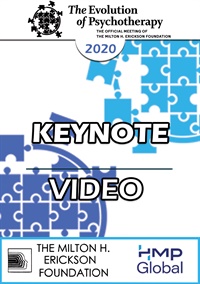
- Average Rating:
- Not yet rated
- Topic Areas:
- Art and Creativity | Training | Keynotes | Psychotherapy | Music | Therapist Development
- Bundle(s):
- EP20 Highlights
- Categories:
- Evolution of Psychotherapy | Evolution of Psychotherapy 2020
- Faculty:
- Jeffrey Zeig, PhD | Rob Kapilow
- Course Levels:
- Master Degree or Higher in Health-Related Field
- Duration:
- 1 hour 5 minutes
- Format:
- Audio and Video
- Original Program Date:
- Dec 10, 2020
- Short Description:
- At the heart of psychotherapy is the idea that listening to someone is an inherently healing act. Can an understanding of the grammar of music help us better understand the grammar of how patients communicate? Join NPR and PBS commentator Rob Kapilow for a unique exploration inside the language of music to see if it can help us learn to listen.
- Price:
-
Sale is $29.00
price reduced from Base Price - $59.00
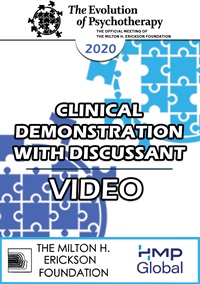
- Average Rating:
- Not yet rated
- Topic Areas:
- Gestalt | Clinical Demonstrations | Clinical Demonstrations with Discussant | Psychotherapy | Therapist Development
- Categories:
- Evolution of Psychotherapy | Evolution of Psychotherapy 2020
- Faculty:
- Erving Polster, PhD | David Burns, MD
- Course Levels:
- Master Degree or Higher in Health-Related Field
- Duration:
- 1 hour 20 minutes
- Format:
- Audio and Video
- Original Program Date:
- Dec 10, 2020
- Short Description:
- Dr. Polster will address the inherent enchantment of therapeutic connectedness and its accompanying openness to enabling personal experiences.
- Price:
-
Sale is $29.00
price reduced from Base Price - $59.00

- Average Rating:
- Not yet rated
- Topic Areas:
- Utilization | Clinical Demonstrations | Psychotherapy | Therapist Development | Intimacy | Psychosomatics | Communication
- Bundle(s):
- Art of Psychotherapy - Utilization Series
- Categories:
- Art of Psychotherapy
- Faculty:
- Jeffrey Zeig, PhD
- Course Levels:
- Master Degree or Higher in Health-Related Field
- Duration:
- 2 Hours 22 Minutes
- Format:
- Audio and Video
- Original Program Date:
- Jul 12, 2020
- Short Description:
- For the final class in the Utilization series, Patricia joins us to discuss her preference for being in control, and how that relates to her struggles with intimacy. She also requests help alleviating a psychosomatic response from an earlier trauma. Dr. Zeig uses an interpersonal approach to this session, utilizing verbal and body language techniques to help communicate complex concepts. Zeig establishes the theme of appreciate as the through-line for this session.
- Price:
- $79.00 - Base Price

- Average Rating:
- Not yet rated
- Topic Areas:
- Utilization | Clinical Demonstrations | Psychotherapy | Therapist Development | Age Regression | Language of Hypnosis | Therapeutic Relationship
- Bundle(s):
- Art of Psychotherapy - Utilization Series
- Categories:
- Art of Psychotherapy
- Faculty:
- Jeffrey Zeig, PhD
- Course Levels:
- Master Degree or Higher in Health-Related Field
- Duration:
- 2 Hours 15 Minutes
- Format:
- Audio and Video
- Original Program Date:
- Jul 05, 2020
- Short Description:
- Our demonstration subject for session three has two presenting issues - an undercurrent of sadness that seems to be everpresent, and a difficulty communicating about financial situations in her life. Dr. Zeig starts off the session by speaking Spanish, Karina’s native language. This simple technique puts Karina quickly at ease and sets the tone for the session. By inducing a hypnotic state Dr Zeig is able to do a quick age regression, and through utilizing a number of linguistic techniques - recursion, speaking in triplicate, altering tempo and tone of voice - he was able to seed therapeutic goals and create motivation for change.
- Price:
- $79.00 - Base Price

- Average Rating:
- Not yet rated
- Topic Areas:
- Utilization | Clinical Demonstrations | Psychotherapy | Therapist Development | Children and Adolescent Therapy | Interviewing | Relationships | Therapeutic Relationship
- Bundle(s):
- Art of Psychotherapy - Utilization Series
- Categories:
- Art of Psychotherapy
- Faculty:
- Jeffrey Zeig, PhD
- Course Levels:
- Master Degree or Higher in Health-Related Field
- Duration:
- 2 Hours 18 Minutes
- Format:
- Audio and Video
- Original Program Date:
- Jun 28, 2020
- Short Description:
- Demonstration subject Mette is struggling with issues trying to feel an emotional connection to her children. She describes her difficulty with being present for her children, and is looking for guidance. Dr. Zeig exhibits a few simple techniques that help create a powerful therapeutic relationship quickly, through the use of gestures and strategic interview questions. Dr. Zeig is able to utilize this information to create useful suggestions to help Mette with her situation.
- Price:
- $79.00 - Base Price

- Average Rating:
- Not yet rated
- Topic Areas:
- Utilization | Clinical Demonstrations | Psychotherapy | Therapist Development | Anxiety | Ericksonian Hypnosis and Therapy Techniques | Religion | Art of Psychotherapy
- Bundle(s):
- Art of Psychotherapy - Utilization Series
- Categories:
- Art of Psychotherapy
- Faculty:
- Jeffrey Zeig, PhD
- Course Levels:
- Master Degree or Higher in Health-Related Field
- Duration:
- 2 Hours 22 Minutes
- Format:
- Audio and Video
- Original Program Date:
- Jun 21, 2020
- Short Description:
- In our first session, our demonstration subject has recently made a major life change. They have decided to change their career from being a priest, into becoming a therapist. Big life changes like these often induce anxiety in patients, and in this clinical demonstration we see Dr. Jeffrey Zeig exhibit a number of Ericksonian techniques to help the client be in harmony with themselves. Dr. Zeig utilizes some of Ginny’s religious history to help guide her towards transformation.
- Price:
- $79.00 - Base Price

- Average Rating:
- Not yet rated
- Topic Areas:
- Clinical Demonstrations | Experiential Therapy | Psychotherapy | Therapist Development | Art and Creativity | Ericksonian Psychotherapy | Art of Psychotherapy
- Bundle(s):
- Art of Psychotherapy - Experiential Series
- Categories:
- Art of Psychotherapy
- Faculty:
- Jeffrey Zeig, PhD
- Course Levels:
- Master Degree or Higher in Health-Related Field
- Duration:
- 2 Hours 15 Minutes
- Format:
- Audio and Video
- Original Program Date:
- Jun 07, 2020
- Short Description:
- In our final class of this series, our demonstration subject has an impediment in learning the German language.
- Price:
- $79.00 - Base Price

- Average Rating:
- Not yet rated
- Topic Areas:
- Clinical Demonstrations | Experiential Therapy | Grief | Psychotherapy | Therapist Development | Art and Creativity | Ericksonian Psychotherapy | Art of Psychotherapy
- Bundle(s):
- Art of Psychotherapy - Experiential Series
- Categories:
- Art of Psychotherapy
- Faculty:
- Jeffrey Zeig, PhD
- Course Levels:
- Master Degree or Higher in Health-Related Field
- Duration:
- 2 hours 22 minutes
- Format:
- Audio and Video
- Original Program Date:
- May 31, 2020
- Short Description:
- The presenting problem for Class 3 is an issue with expressing sadness and grief.
- Price:
- $79.00 - Base Price

- Average Rating:
- Not yet rated
- Topic Areas:
- Clinical Demonstrations | Experiential Therapy | Psychotherapy | Therapist Development | Art and Creativity | Ericksonian Psychotherapy | Art of Psychotherapy
- Bundle(s):
- Art of Psychotherapy - Experiential Series
- Categories:
- Art of Psychotherapy
- Faculty:
- Jeffrey Zeig, PhD
- Course Levels:
- Master Degree or Higher in Health-Related Field
- Duration:
- 2 Hours 25 Minutes
- Format:
- Audio and Video
- Original Program Date:
- May 24, 2020
- Short Description:
- Our demonstration subject for Class 2 is a psychiatrist who would like to become a better leader.
- Price:
- $79.00 - Base Price

- Average Rating:
- Not yet rated
- Topic Areas:
- Experiential Therapy | Clinical Demonstrations | Phobia | Psychotherapy | Therapist Development | Art and Creativity | Ericksonian Psychotherapy | Art of Psychotherapy
- Bundle(s):
- Art of Psychotherapy - Experiential Series
- Categories:
- Art of Psychotherapy
- Faculty:
- Jeffrey Zeig, PhD
- Course Levels:
- Master Degree or Higher in Health-Related Field
- Duration:
- 2 Hours 5 Minutes
- Format:
- Audio and Video
- Original Program Date:
- May 17, 2020
- Short Description:
- The presenting problem for Class 1 is fear.
- Price:
- $79.00 - Base Price

- Average Rating:
- Not yet rated
- Topic Areas:
- Workshops | Love | Brief Therapy | Motivation | Solution Oriented Approach | Therapist Development
- Categories:
- Erickson Congress | Erickson Congress 2019
- Faculty:
- Michael Munion, MA, LPC
- Duration:
- 1 Hour 31 Minutes
- Format:
- Audio Only
- Original Program Date:
- Dec 15, 2019
- Short Description:
- This workshop provides a framework for assessing clients along two important dimensions that impact therapeutic outcome: motivation and sense of agency (one’s perception of their ability to create change in their own lives). This assessment fosters interventions that enhance the capacity for strategic interventions to be truly brief and solution focused. The participant in this workshop will have the opportunity to observe and practice this approach.
- Price:
- $15.00 - Base Price

- Average Rating:
- Not yet rated
- Topic Areas:
- Workshops | Trauma | Therapeutic Relationship | Therapist Development
- Categories:
- Erickson Congress | Erickson Congress 2019
- Faculty:
- John Beahrs, MD
- Duration:
- 1 Hour 59 Minutes
- Format:
- Audio Only
- Original Program Date:
- Dec 15, 2019
- Short Description:
- Ratifying victimhood often paradoxically sensitizes to trauma’s effects, and is heavily reinforced socially. Therapists are challenged to help victims restore personal agency and accountability, without denying victimhood. Contracting for roles and boundaries precedes efforts to interdict traumatic re-enactment, redefine personal and social identity, access locus of control, and restore accountability.
- Price:
- $15.00 - Base Price

- Average Rating:
- Not yet rated
- Topic Areas:
- Topical Panels | Humor | Therapist Development
- Categories:
- Erickson Congress | Erickson Congress 2019
- Faculty:
- Rick Miller, MSW | Donald Miretsky, M.Ed | Bill O'Hanlon, MS
- Duration:
- 57 Minutes
- Format:
- Audio Only
- Original Program Date:
- Dec 13, 2019
- Short Description:
- Jokes can be used as a vehicle in which therapeutic messages can be couched. Humor can enliven the therapeutic situation.
- Price:
- $15.00 - Base Price



